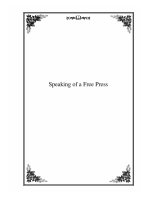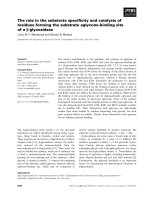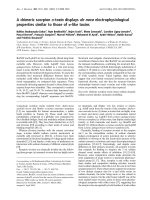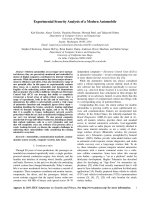Prison of a Billion Years doc
Bạn đang xem bản rút gọn của tài liệu. Xem và tải ngay bản đầy đủ của tài liệu tại đây (352.12 KB, 16 trang )
Prison of a Billion Years
Thames, C.H.
Published: 1956
Categorie(s): Fiction, Science Fiction, Short Stories
Source: />1
Copyright: Please read the legal notice included in this e-book and/or
check the copyright status in your country.
Note: This book is brought to you by Feedbooks
Strictly for personal use, do not use this file for commercial purposes.
2
Transcriber's Note:
This etext was produced from Imagination April 1956. Extensive re-
search did not uncover any evidence that the U.S. copyright on this pub-
lication was renewed.
3
A
dam Slade crushed the guard's skull with a two foot length of iron
pipe. No one ever knew where Slade got the iron pipe, but it did
not seem so important.
The guard was dead. That was important.
And Slade was on the loose. With a hostage.
That was even more important.
The hostage's name was Marcia Lawrence. She was twenty-two years
old and pretty and scared half out of her wits. She was, before she be-
came a hostage, a reporter for Interplanetary Video. She had been gran-
ted the final pre-execution interview with Adam Slade and she had
looked forward to it a long time but it had not worked out as planned.
It had not worked out as planned because Slade, only hours from the
execution chamber with absolutely nothing to lose, had splattered the
guard's brains around the inside of his cell and marched outside with a
frightened Marcia Lawrence.
Outside. Outside the cell block while other condemned prisoners
roared and shouted and banged tin cups on bars and metal walls and
judas-hole-grills. Outside the prison compound and across the dome-en-
closed city which served the prison.
Then outside the dome.
Outside the dome there was rock. Rock only, twisted and convoluted
and thrusting and gigantic like monoliths of a race of giants. Rock alone
under the awesome gray sky. Steaming rock, for some of the terrestrial
waters were still trapped at great depths. And the sea far off, booming
against rocky headlands, hissing tidally and slowly, in an age-long pro-
cess, pulverizing the rock. The sea far off, a clean sea, not sea-smelling
sea, a sea whose waters must evaporate countless times and be borne up
over the naked rocks in vapor and clouds and come down in pelting,
endless rain and rush across the rock, frothing and steaming—a sea
which must do this countless times in the eons to come, and would do it,
to bring salinity to its own waters.
"It kind of scares the hell out of you, doesn't it?" Adam Slade said. He
was a big man with a thick neck and heavy, sleepy-looking eyes and a
blue beard-shadow on his stubborn jaw. He said those words as he
climbed out of the prison tank with Marcia Lawrence. The tank's metal
was still warm from over-heated travel.
"I didn't think anything would scare you," Marcia Lawrence said. She
had conquered her initial terror in the five hours of clanking tank flight
from the prison. They had come a great many miles from the prison
dome, paralleling the edge of the saltless sea and then finally, when their
4
fuel was almost gone, clanking and rattling down toward the sea. She
was a newspaperwoman, that above all now. She must not be afraid. She
had a story here. A story.
"Get moving," Adam Slade said. "I got nothing against you, lady," he
told her for the tenth time. "But you try anything, you're dead. You get
that? I got nothing to lose. One time is all they can kill me. But first they
got to find me, but they won't be able to take me as long as you're here.
Just stay meek and you'll stay alive."
"How long do you think you can hold out?" Marcia Lawrence asked
practically. They had begun to walk away from the now useless tank.
Adam Slade was carrying the dead guard's M-gun in the crook of his
bent left arm and walking with long, easy, ground-consuming strides.
Marcia almost had to run to keep up with him as they went down a
stretch of slightly sloping black rock toward the steaming, hissing,
pounding, roaring, exploding surf.
Slade smiled. "Plenty of water," he said.
"But no food, Mr. Slade. There is absolutely no food on earth now and
no possible way of getting food unless you want to stick around for a
few million years."
"You think I came out here without a plan?" Slade asked with some
hostility.
"I don't know. You were desperate."
"As long as you're with me I figure they might follow, but they won't
rush me. They might even send over a 'copter, but it won't try anything.
Not with you here. Desperate? I'm not desperate, and don't you forget it.
Desperate you don't think straight. Once is all they can execute me. I
stayed behind, they'd of done it. If they catch me, they'll do it. What's the
difference?"
"You said you had a plan."
T
hey reached the edge of a thrusting headland, an enormous beak-
shaped cliff of beetling black rock which leaned out over the young,
still saltless ocean. Slade paced back and forth quickly, with a powerful
leonine grace, until he found a fault in the rock. The fault tumbled jag-
gedly, steeply down almost to the edge of the sea.
"Down there," Slade said. "We'll follow the sea coast back to the
prison."
"Back?" Marcia said in disbelief.
"Hell yes, back. You said it yourself. There's no food out here. Since
there ain't no life, of course there's no food. Oh, it's a great place for a
5
prison, all right. Whoever thought of it ought to win a prize. A prison—a
billion years in the past. What's the word?"
"Archaeozoic," she supplied.
"Yeah, archaeozoic. An archaeozoic prison. You can escape to your
heart's content, but what the hell's the difference. There's no life back
here, not yet. The Earth's just a baby. So you escape—and you starve to
death. It makes every maximum security jail before this one look like a
kid's piggy bank."
"There hasn't ever been an escape," Marcia said hopefully as they
made their way down to the sea, she in front and Slade behind her with
the M-gun.
"There ain't never been a hostage before."
"No-o."
"There's a hostage now."
Marcia Lawrence took a deep breath and asked suddenly, "Are you
going to kill me?"
"Hell, I don't know. I got no reason to—unless you make me. We're go-
ing back there. We're double-tracking along the beach, get me? Back to
the prison dome."
"But—"
"Adam Slade won't starve to death out here. We'll double back to the
dome—and the time machine."
"Oh," she said. They began to walk along the edge of the sea, its waters
sullen gray, mirroring the sky. Here on this dawn earth the sky has as yet
never been blue, for the primordial waters were still falling, falling. It
rained almost all the time and the air was thick with moisture and every
night when the sun—as yet unseen by the dawn earth except as an invis-
ible source of light—went down and darkness came, the mists rolled in
from the sea. In the morning whether rains had fallen or not the ground
was soaked and tiny freshets rushed down to the sea, returning to it.
"Look out!" he cried suddenly, and shoved her against the base of the
cliff which overlooked the water. The cliff top thrust out over them,
umbrella-wise. The base of the cliff was thus a concavity and they
pressed themselves against it now, in shadow. The waters of the infant
sea were a hundred yards away, surging and booming against the rock.
She heard it soon after he did. A helicopter. She wanted to scream. She
wondered if they would hear her scream. But she looked at Adam
Slade's face and did nothing. Soon the helicopter came, buzzing low over
them, searching. It circled a great many times because the abandoned
tank was there. It circled and came down on the beach and two
6
uniformed figures got out. Now she really wanted to scream. One sound.
One sound and they would hear her. One quick filling of the lungs
and—
Adam Slade hit her suddenly and savagely and the black loomed up at
her but she did not remember striking it.
When she awoke, the helicopter was gone.
"Sorry I had to poke you one," Slade said. He did not seem sorry at all.
He said it automatically and then added: "You ready to walk?"
She nodded. She got up and staggered a few steps before her legs
steadied under her. Then with Slade she walked down along the rocky
beach. This, she thought, was a story. It was the only big story she had
ever had and probably she would not live to write it. As a woman, she
was almost hysterical with fear, but as a videocaster she was angry. The
story was hers—if she lived to tell it.
Then she had to live.
Time prison. Sure, she thought. Utterly escape proof—unless someone
like Slade could take a hostage, double back to the prison dome, the her-
metically sealed dome and somehow trick or overpower the guards who
watched the time traveling machine outside the prison dome.
Outside. Naturally, it would be outside. That way the prisoners
couldn't get at it.
Unless, like Slade, they too were outside.
Outside, where life had not yet been born. Outside, the infant earth.
Let a man escape. What did his escape matter? He would live exactly as
long as it took a man, reasonably healthy, to starve to death.
Unless he had a hostage and a plan… .
S
he became aware of rain when they left the cliff overhang. There
was almost no wind and the rain came down slowly at first, huge
slow drops which splattered on the black rock.
"If it gets any harder," Slade said, "we'll have to duck under the cliff for
protection. You don't know what a rain can be like back here. I seen them
through the dome."
But they couldn't go under the cliff for protection, not if they wanted
to keep going. For the cliff dropped suddenly in a wild jumble of rocks
and then there was nothing but the sloping black beach, sloping down to
the sea.
Then, all at once, someone opened the sluicegates and the rain bom-
barded them. It slapped and bounced off the rock like pistol shots. It
struck them like hammers. They staggered under its weight.
7
"We'll have to go back to the cliffs!" Marcia cried. She yelled it again at
the top of her voice because she realized Slade would not hear her other-
wise as the rain cracked and exploded and splattered and crashed. There
were no droplets of water. For each one had size and shape and weight,
swift-falling, hammering weight as it came down. Each one, Marcia
thought wildly, struggling to keep her feet, was the size of your clenched
fist there in the gray dawn of Earth.
"The cliffs!" she cried again.
But Adam Slade shook his head, grabbed her arm above the wrist and
pulled her after him. He pointed ahead, in the direction they had been
going. He said nothing. There was no need to talk. They were going for-
ward and if it killed them probably Adam Slade did not care much.
He wanted that prison time machine for his escape and he was either
going to get it or die in the attempt.
They went on slowly. First one would fall and then the other and
when it was Slade who had fallen, she would wait patiently, hopefully. If
he ever released his hold on the M-gun—
But if it were Marcia who fell, Slade would yank her to her feet sav-
agely, yelling words which she had heard at first but which after a while,
after an eternity of the storm, seemed to merge with the sound of the rain
and the far booming of thunder out over the water and then, as if by ma-
gic, she was walking again and stumbling along with Slade, drenched
and beaten and half-drowned.
She hardly remembered when night came, but presently she was
aware of the darkness and the mist over the sea and over the rock and
now engulfing them with its white ectoplasmic tendrils. In the mist she
knew she could escape Slade, and yet she did not. Without Slade now,
now in the middle of nowhere there by the sea on the shores of the
young Earth, she would die in the storm. With Slade—at least for
now—was life. And she went on.
The thunder followed them—and came closer.
By the middle of the night it sounded like artillery at a distance of half
a mile, like a barrage of big atomic shells just out of sight behind a black
ridgeline which wasn't there. And through the deeper rain-wet darkness
of early morning, through the mist, tearing the mist to tatters, shredding
it, came the spears and forks and lances of lightning. It was, Marcia
thought, a nightmare of a storm. And she must remember it, for it would
make a story, a real story, if ever she lived to tell it.
By morning, the air smelled of ozone. It reeked of ozone and around
them as the gray light seeped out of the wet sky and the rain suddenly
8
slackened as if the weak daylight dispelled it, the black rocks were blas-
ted and broken where lightning had struck.
In the dawn's first light another helicopter came.
"Get down!" Slade shouted, and they dropped among the blasted black
rocks, hiding there, not moving. The helicopter came on through the
slackening rain, buzzing a few hundred feet over them but not circling. It
was heading for the abandoned tank, Marcia thought. It wasn't looking
for them here—
But suddenly the rain came down in all its savage force again, blinding
bounding off the rocks, pounding relentlessly.
Overhead, the helicopter seemed to pause like a bird stricken in flight.
The rotors whirled a silver shield against the rain, the great drops splat-
tering off the shield.
And the helicopter came down under the weight of the rain.
I
t landed a hundred and fifty yards from them down the beach and
Marcia watched breathlessly while three men got out and looked at
each other and at the rain. The dawn light was still only a dim gray and
Marcia could not see the men clearly, but abruptly a jagged spear of
lightning blasted rock midway between where they were hiding and the
helicopter and in the after-glare through the wet and almost crackling
air, the men were very clear. And clearer still when other lightning came
down around them, ringing them in, it seemed, like a tent. There was
now so much lightning it looked more like an aurora than an electric
storm.
The dawn earth, before life, spending itself in fury… .
All at once Marcia was running down toward the edge of the water,
where the helicopter was. She ran screaming and shouting but the thun-
der swallowed her puny voice. At every moment she expected Adam
Slade to kill her, to merely stand up with the M-gun and shoot her, but
he did not and perhaps her unconscious mind in the instant she had fled
had instinctively known he would not. For if Adam Slade killed her, he
had no hostage. If he killed her and they found him, he would have ab-
solutely no chance.
She turned and looked behind her. There was Slade, silhouetted
against the lightning, running, covering the ground in huge strides, gain-
ing on her. She did not look back again. The whole world was lightning
and thunder and her legs striking earth under her, up and down, up and
down, pounding, running, fleeing, and the rain, Slade's ally, beating her,
buffeting her, exploding against her.
9
She stumbled and fell but she was up and running again in a moment.
Now Slade was very close. But the helicopter was close too. She did not
think the men there had seen them yet. She waved her arms and
screamed although she knew the screams would not be heard—and then
Slade was on her.
They went down together and she knew she was frail and helpless be-
fore his great strength. He grabbed her, his hands, angry hands on her
throat—
And lightning struck.
It bounded and bounced off rock a dozen feet from them. It shook the
earth and blasted the rock and pieces like shrapnel cluttered all around
them and struck them too and Marcia felt hot blood on her arm and it
was her own blood.
But Slade had been momentarily stunned and she was running again.
Away from him.
But away from the helicopter too. At first she did not realize that but
when she did realize it, it was too late. If she doubled back now, she
would rush into Slade's arms.
She ran—into the sea.
It was suddenly, unexpectedly calm. It merely eddied around her
ankles, as if waiting for something. The storm seemed to be waiting too,
lightning holding back, the thunder stilled, even the rain hanging there
in the black heavy sky, waiting… .
Slade came after her, stalking through the surf.
A single bolt of lightning lanced down at them and a great engulfing
roar lifted Marcia, carried her, stunned her, and then the rain pelted
down again and the sea was an angry sea and the air was supercharged
with ozone and another smell. Like seared flesh.
Like seared flesh.
She saw Adam Slade then. Slade was down in a foot of water, face
down. He was not moving and the water lapped around him, over him.
She went to him, walking slowly.
The men from the helicopter were there too. They had seen in that fi-
nal flash of lightning.
"Are you all right, miss?" one of them shouted.
"Yes. Slade?"
They turned him over. They looked at him. "Dead," one of them said.
"Dead," she echoed. She would have collapsed, but they caught her.
10
T
hen the rain really came down, not as it had come before, which
was hard enough. It came in huge globes of water and each globe
was as big as your head and if it hit it could stun you.
"Slade?" someone cried as the globes exploded violently in the surf
around them.
"He's dead. He'll keep."
And they went back to the helicopter with Marcia, to await the end of
the storm there.
When it was over, when the sky was not black but merely the color of
lead, they returned down the beach for Slade's body.
But Slade wasn't there.
"But he was dead!" Marcia said incredulously.
One of the men smiled. "He didn't go anyplace under his own power.
He was dead, all right. The storm took his body out to sea, is all."
They stood there for a moment, gazing out across the black troubled
water of the infant ocean on the infant earth. A billion years ago… .
Slade was out there. Slade, dead. Out there with the tides and the wa-
ters and the frequent electric storms—
"Out there with a million bacteriological parasites on his dead body
and in his dead body, which he brought with him," Marcia said,
dreamily.
"What are you talking about, miss?"
Out there in the electric dawn of earth, with the bacteria which lived in
his body as they lived in all other bodies. Out there with them, dead.
Food for them.
Food and water and air heavy with ozone and the electric storms.
Marcia laughed hysterically. It was a story she wanted to write.
But she wouldn't write it.
Slade was a killer, condemned to die. But Slade, dead out there with
his bacteria, Slade evil to man and human society but not necessarily evil
in the implacable ways of nature or perhaps grimly, terribly evil—Slade
out there, dead on the bosom of the primordial waters, Slade back in
time a billion years before life had been born on Earth… .
She laughed hysterically as they led her away from the water. They
slapped her face, gently at first, then harder. "I'll be all right," she man-
aged to say.
She would be all right. She could live to forget it.
But Slade out there.
Slade.
11
Slade fathering all life on earth there in the sea with his dead body.
Slade who had sinned and was taken back here to die for his sins so that
life could be born.
Slade, whose first name was Adam.
12
Loved this book ?
Similar users also downloaded
Marah Ellis Ryan
The Treasure Trail
Combining thrills of Mexican-American border life, German-Mex-
ican plots, the adventures of a cowpuncher-miner and the happy
termination of his quest for love and wealth, this tale holds the
reader's attention from beginning to end.
Alan Nourse
Marley's Chain
Tam's problem was simple. He lived in a world that belonged to
someone else.
Winston K. Marks
Unbegotten Child
If this was true, there ought to be another edition of What Every
Young Girl Should Know!
Philip K. Dick
The Variable Man
He fixed things—clocks, refrigerators, vidsenders and destinies.
But he had no business in the future, where the calculators could
not handle him. He was Earth’s only hope—and its sure failure!
Stephen Arr
Chain of Command
By going through channels, George worked up from the wood-
work to the top brass!
W. W. Skupeldyckle
The Romantic Analogue
Norm Venner's fancy was pretty well fixed on thoughts of elec-
tronic calculators—until the invention started making passes at
the inventor!
Floyd L. Wallace
Tangle Hold
Jadiver objected to being the greatest influence for good on Venus
because what was good for Venus was bad for Jadiver!
Stephen Marlowe
The Dictator
Ellaby's society was a perfect democracy, where all men were
equal. But some still wanted more personal attention, and they got
it, like— The Dictator.
13
Stephen Marlowe
The Graveyard of Space
Nobody knew very much about the Sargasso area of the void; only
one thing was certain: if a ship was caught there it was doomed
in—The Graveyard of Space.
Paul W. Fairman
The Beasts in the Void
Holloway was used to big game hunters and their expeditions to
other worlds. But this trip was sheer madness—a space ship stalk-
ing among—The Beasts in the Void
14
www.feedbooks.com
Food for the mind
15









